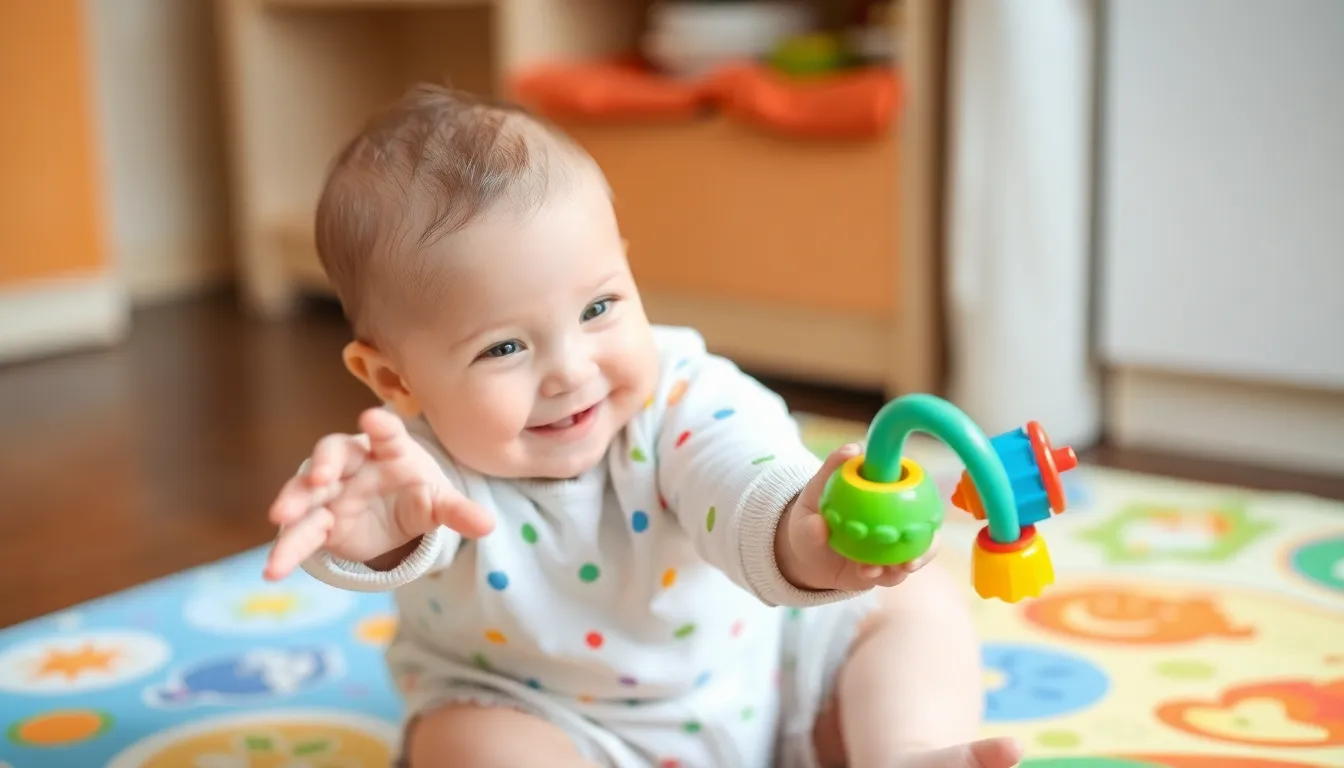Table of Contents
ToggleWatching a baby grow is like witnessing a tiny superhero in training. Each milestone they hit feels like an epic achievement worthy of a standing ovation. From that first wobbly crawl to the triumphant moment they say “mama” or “dada,” every step is a reminder that they’re not just growing; they’re conquering the world one giggle at a time.
Understanding Baby Milestones
Understanding baby milestones is crucial for tracking a child’s development. Various stages signify important growth areas, including physical, social-emotional, cognitive, and language skills. Each milestone represents a leap forward in a child’s abilities.
Physical growth milestones often start with rolling over by 3 to 6 months. Sitting up independently usually occurs around 6 to 9 months. For many children, standing and taking steps follow between 9 to 15 months.
Social-emotional milestones include responding to their name and expressing emotions like joy or frustration by 6 to 9 months. Engaging in simple games such as peek-a-boo typically develops between 9 to 12 months.
Cognitive skills emerge with curiosity. Babies often explore objects by 4 to 7 months, indicating their need to understand their environment. By 12 months, problem-solving skills become more apparent as they figure out how to reach a toy out of sight.
Language milestones progress from cooing and babbling around 3 to 6 months to saying simple words like “mama” or “dada” by 12 months. This gradual increase in communication shows a child’s growing ability to express needs.
Awareness of these milestones helps parents support their children’s growth. Tracking each step allows for tailored activities that challenge and engage developing skills. Pediatricians recommend regular check-ups to ensure each child is on track, addressing any concerns early. Recognizing these milestones fosters a sense of accomplishment for both parents and children.
Physical Milestones

Physical milestones mark key moments in a baby’s growth and development. These achievements reveal the child’s readiness to explore the world.
Gross Motor Skills
Gross motor skills involve large muscle movements, essential for mobility. At around 2 months, babies can lift their heads while lying on their stomachs. By 6 months, many sit with support. Moving forward to 9 months, crawling becomes common, allowing babies to explore their environment. Most infants take their first steps between 9 and 15 months, leading to walking independently. Each of these milestones plays a crucial role in a child’s physical development and confidence.
Fine Motor Skills
Fine motor skills involve smaller movements requiring hand-eye coordination. Infants begin by grasping objects around 3 months, transitioning to purposeful reaching and grabbing by 6 months. Around 9 months, they can transfer objects between hands, showcasing developing dexterity. By the time a child is 12 months old, they start using a pincer grasp to pick up smaller items, indicating refined motor control. Each fine motor skill milestone helps prepare a child for future tasks like writing and self-feeding.
Cognitive Milestones
Cognitive milestones reveal a baby’s growth in understanding and interacting with the world. These skills encompass problem-solving abilities and language development.
Problem-Solving Skills
Problem-solving skills begin to emerge as babies explore their environment. At 6 months, infants start to show curiosity by reaching for toys and examining them closely. By 9 months, they experiment with cause and effect, such as shaking a rattle to produce sound. At 12 months, children demonstrate more complex problem-solving, like finding hidden objects or manipulating items to achieve a goal. Engaging in interactive play enhances their cognitive development significantly, encouraging them to think creatively and develop solutions independently.
Language Development
Language development evolves rapidly during a baby’s first year. At 3 months, cooing and babbling introduce sounds and rhythms of speech. By 6 months, babies begin to recognize their names and respond to simple words. Around 9 months, they start mimicking sounds and gestures, laying the groundwork for problem-solving and communication. By the end of their first year, toddlers usually say their first words, marking a pivotal moment in their verbal skills. Engaging in conversations and reading aloud cultivates this development, fostering vocabulary growth and language comprehension.
Social and Emotional Milestones
Social and emotional milestones play a crucial role in a child’s overall development. These milestones reflect how babies interact with caregivers and their environment.
Attachment and Bonding
Attachment forms as infants bond with caregivers. Babies typically start showing attachment behaviors by 3 to 6 months. Eye contact and smiling strengthen this connection. By 9 months, they often express anxiety when separated from primary caregivers. Secure attachment is vital for emotional health and influences future relationships. Signs of strong attachment include preference for specific caregivers and seeking comfort from them. Monitoring these behaviors helps ensure babies cultivate secure connections essential for their social development.
Social Interactions
Social interactions begin early in a child’s life. By 4 to 6 months, babies engage in reciprocal smiling and vocalizations. Interactions evolve as they respond to others’ emotions and gestures. At around 9 months, children may show interest in other infants and adults. They participate in simple games like peek-a-boo, fostering communication skills. By their first birthday, many babies attempt to imitate social behaviors, signaling readiness for group activities. Observing these interactions illuminates a child’s developing social skills and emotional awareness.
Tracking Baby Milestones
Tracking baby milestones provides a clear picture of a child’s development. Parents can use developmental checklists to monitor progress.
Developmental Checklists
Developmental checklists serve as practical tools for parents. These guides typically outline key milestones in categories like physical, cognitive, social-emotional, and language skills. For instance, the checklist might include rolling over by 4 months and walking independently by 15 months. Tracking significant achievements offers clarity on where the child stands in their growth. Moreover, it enhances communication with pediatric professionals. Consistently reviewing these checklists ensures parents catch any variations in development early.
When to Seek Professional Help
Seeking professional help is crucial if there are concerns about development. Parents should consider consulting a pediatrician if milestones are missed consistently. Signs of concern may include a lack of cooing by 4 months or not walking by 18 months. Observing difficulties in social engagement, such as not responding to their name, also warrants attention. Early intervention can make a significant difference in a child’s development. Professionals can assess and recommend appropriate strategies to support the child’s growth effectively.
Celebrating baby milestones is an essential part of parenthood. Each achievement marks a step in a child’s journey toward independence and self-expression. Recognizing these milestones not only fosters a deeper understanding of a child’s development but also strengthens the bond between parent and child.
By staying informed and engaged, parents can provide the necessary support for their child’s growth. Regular check-ups and open communication with pediatric professionals can ensure that any concerns are addressed promptly. Ultimately, cherishing these moments and milestones creates lasting memories that families will treasure as their little ones grow into confident individuals.




